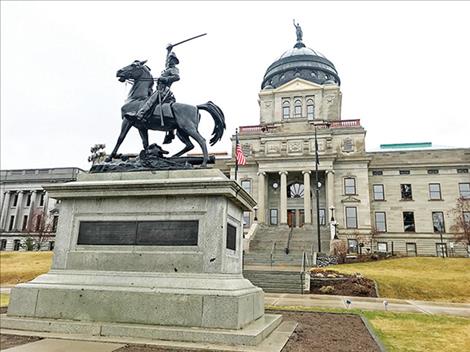In court, media outlets argue for access to legislative records
The records of communications between legislators, staffers, lobbyists and others had been public for more than three decades before a change last year.
Hey savvy news reader! Thanks for choosing local.
You are now reading
1 of 3 free articles.
MONTANA — Concealing the back-channel communications between lawmakers, lobbyists and stakeholders when drafting bills amounts to the Legislature violating the state’s Constitution, a coalition of media outlets including Montana Free Press argued in court Friday.
Appearing before District Judge John Kutzman in Great Falls, the media organizations asked for an injunction blocking the redaction of bill draft folders known as “junque files,” which contain communications between lobbyists, legislators and staffers as bills are being written.
Legislative staff began redacting the files at lawmakers’ requests in September, following a separate lawsuit ruling that shielded a Kalispell senator from producing evidence to be used against him in court. Legislative staff then applied that ruling broadly to documents that had previously been considered public for more than 30 years.
“Unlike a party in a civil litigation, the press is not after this information to use it in some way, in some judicial proceeding against a legislator,” attorney Kyle Nelson told the court. “They are using this information for the benefit of the public, to shine a light on what the government is doing, nothing more.”
The protections shielding legislators from testifying against themselves or producing evidence that does the same are intended to protect lawmakers from intimidation by the other two branches of state government, the governor and the judiciary. Lawmakers also can’t be prosecuted for legislative acts, Nelson argued.
Attorneys for the Legislature argued that prying into junque files comes close to revealing a legislator’s “preliminary mental impressions.” Attorney Brent Mead, with the Montana Department of Justice, said the practice of providing those files went too far.
“What we’re talking about is the legislator’s mental impression of what they want to do with a given piece of legislation during the drafting process,” Mead said. The attorney argued that conversations with lobbyists and stakeholders while conceptualizing bills should be considered part of a lawmaker’s thought process and protected.
Mead referenced a Thursday Montana Supreme Court ruling that granted the governor narrow protections, like attorney-client privilege and personal privacy, when disclosing details about which legislative bills he selected to track through the 2021 legislative session. The court ruled that Gov. Greg Gianforte was entitled to keep private some consultation with legal staff regarding bills but would have to justify each nondisclosure.
The governor argued he had a blanket executive privilege not to disclose, which the court rejected.
Journalists testifying Friday said junque file contents improved their reporting, while frequently showing when lobbyists and those they work for doing the drafting benefit from a bill’s passage.
“We have some occasions where we also want to know who’s helping draft this bill. What entities have submitted information, have requested information about this. Where is this draft coming from?” said Mike Dennison, a veteran Capitol reporter (and new member of the Montana Free Press board of directors). “For instance, is it coming from the Montana Power Co., NorthWestern Energy? Is it coming from big hospitals? Is it coming from the insurance industry? Those are just some random examples. Often, we know of a bill and have heard there were entities that were involved in the drafting.”
The hearing Friday stemmed from a lawsuit initiated in October by the Montana Environmental Information Center, Great Falls resident David Saslav, and Butte public defender Kaylee Hafer. All three plaintiffs petitioned the court to make junque files public again, a precedent based on a court ruling obtained by MEIC 30 years ago.
Soon after the lawsuit was filed, the media coalition petitioned to intervene. Montana Free Press Deputy Editor Eric Dietrich described requesting junque file contents in October concerning a proposed tax law but receiving a redacted document with no useful details. Included in the redaction was contact information for involved lobbyists.
Not all lobbyists involved in writing a bill participate when the bill is heard in committee, Dietrich said.
“Sometimes those people make things happen from behind the scenes, where they’re involved in drafting the bill, and then they may or may not participate in the public process through committee hearings and stuff that happens after a bill is introduced,” Dietrich said. “ … That bill could be passed into law, written by an outside interest group, without there being opportunity for the public to know who that interest group is.”
The lawsuit behind Friday’s hearing unpacks the original arguments made by drafters of Montana’s Constitution in 1972 for opening legislative work to the public, among them Constitutional Convention delegate Daphne Bugbee of Missoula.
“The Legislature passes laws that affect every person in Montana. There is really no justification for keeping this process a secret from the people. The people need to know and have a right to know the reasons for committee votes,” Bugbee said at the convention.
The Legislature’s argument that some details are beyond public reach stems from a court ruling granting Republican Sen. Keith Regier, R-Kalispell, privacy in his communications regarding a 2023 bill that redrew political districts.
Regier successfully fought off an attempt to produce his communications with third parties concerning the redrawing of the state’s five Public Service Commission districts.
By September, attorneys for the Legislature had crafted a form allowing lawmakers to opt out of disclosing communications with lobbyists and “stakeholders,” meaning parties directly benefiting from or adversely affected by proposed bills.
Montana Free Press is an independent, 501(c)(3) nonprofit source for Montana news, information, and analysis. Our mission is to produce in-depth public-service journalism that creates positive change and helps move society toward justice and equity.
MTFP seeks to uncover the truth and bring to light essential news stories by studying arcane bureaucratic processes, seeking out dark corners of major institutions, digging deep into data and documents, and holding power accountable to the people.
We work independently and in collaboration with other news outlets to produce meaningful news stories that have an impact on the lives and livelihoods of local communities.
Visit MontanaFreePress.org to learn more.
















